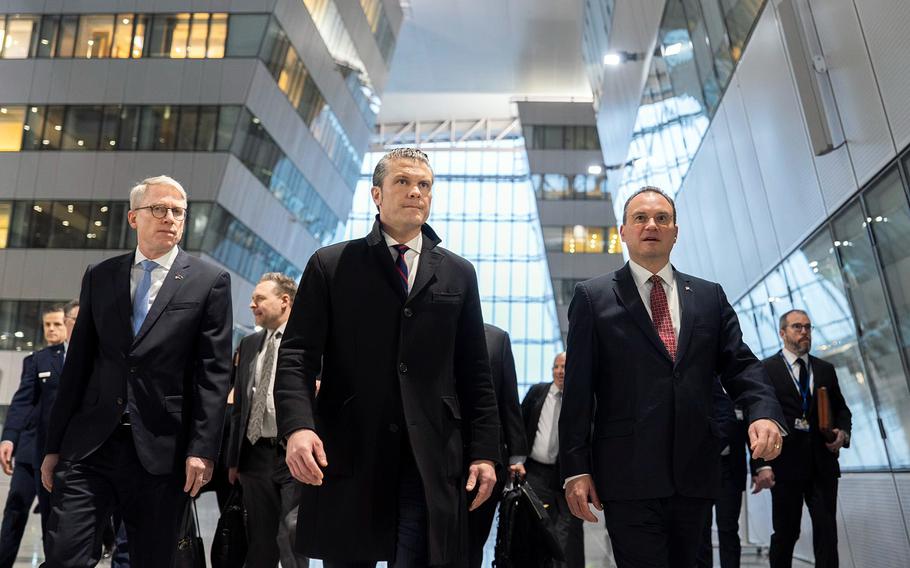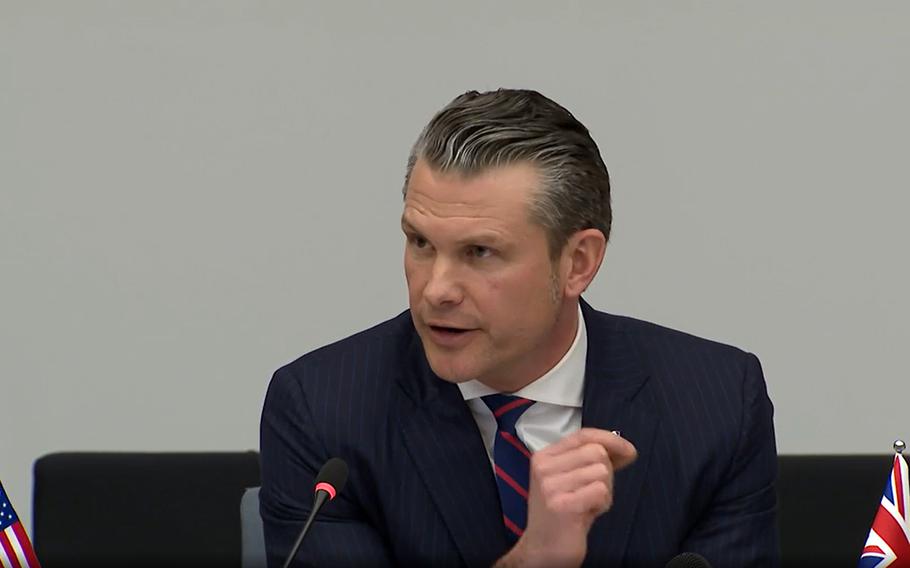
Defense Secretary Pete Hegseth, center, arrives at NATO headquarters in Brussels for the 26th Ukraine Defense Contact Group meeting in Brussels, Feb. 12, 2025. (X/Secretary of Defense)
STUTTGART, Germany — Defense Secretary Pete Hegseth said Wednesday that the United States has ruled out NATO membership for Ukraine as part of any peace deal with Russia and that a return to the country’s prewar borders is an unrealistic objective.
“Chasing this illusionary goal will only prolong the war and cause more suffering,” Hegseth told a gathering of allies in Brussels.
The new Pentagon chief, making his first trip to NATO headquarters, said any durable peace for Ukraine must include “robust security guarantees” to ensure that the war will not begin again.
However, U.S. troops will not play a role in any peacekeeping activity in Ukraine, Hegseth said. Instead, European countries and non-European troops should do the job, albeit not under NATO’s auspices, he added.
“If these troops are deployed as peacekeepers to Ukraine, at any point, they should be deployed as part of a non-NATO mission, and they should not be covered under Article Five,” Hegseth said, referring to the alliance’s provision that an attack on one demands a collective NATO response.
Hegseth’s comments came at the start of the Ukraine Defense Contact Group, which was previously a U.S.-led effort but now is being headed by the United Kingdom.
The group, organized by former Defense Secretary Lloyd Austin, was formed in the aftermath of Russia’s full-scale invasion of Ukraine nearly three years ago.
Hegseth said the lion’s share of the burden when it comes to supporting Ukraine now must shift to Europe.
“Members of this contact group must meet the moment,” he said. “This means donating more ammunition and equipment, leveraging comparative advantages, expanding your defense industrial base, and importantly, leveling with your citizens about the threat facing Europe.”
Hegseth reiterated President Donald Trump’s demand that member states spend 5% of gross domestic product as the minimum for defense spending, a sharp increase from the current 2% benchmarks.
“We’re also here today to directly and unambiguously express that stark strategic realities prevent the United States of America from being primarily focused on the security of Europe,” Hegseth said.

Defense Secretary Pete Hegseth speaks at the opening of the 26th Ukraine Defense Contact Group meeting at NATO headquarters in Brussels, Feb. 12, 2025. (NATO)
He said U.S. border security and the challenge posed by China in the Pacific are America’s priorities.
“Deterrence cannot fail for all of our sakes,” Hegseth said. “As the United States prioritizes its attention to these threats, European allies must lead from the front.”
While the United States remains committed to the NATO alliance, it will “no longer tolerate an imbalanced relationship” that enables military dependency, he added.
Hegseth’s remarks came ahead of a meeting of NATO defense ministers Thursday, where military spending will be at the top of the agenda. Secretary-General Mark Rutte said allies are working on a plan that will call on member states to exceed the 2% GDP benchmark.
“This requires that many allies, especially in Europe and Canada, invest considerably more,” Rutte said.
The NATO chief stopped short of issuing a precise amount, but said the new spending benchmark would be “north of 3%.”
Some members have already balked at Trump’s call for a benchmark of 5% of GDP. The U.S. spends about 3.4% of its GDP on defense, though in total spending that is still hundreds of billions of dollars more than any other country.
Hegseth deferred when asked during a news conference in Stuttgart on Tuesday whether U.S. defense spending would rise to the 5% level.
“Well, I think the U.S. needs to spend more than the Biden administration,” he said.
Rutte said European security is at stake if overall alliance spending doesn’t increase this year.
“We are safe now. Our deterrence and defense [are] strong at this moment, but not in four or five years if we do not take some difficult decisions this year,” Rutte said.
Russia’s economy is on a war-time footing, with about 40% of its budget being directed toward its military, Rutte said. That has enabled Moscow to far outpace NATO when it comes to ammunition production.
“We have to do more, including making sure that they can fight prolonged wars and that they will be more heavily armed,” Rutte said.
At the same time, allies must continue efforts to arm Ukraine to ensure Kyiv is in the strongest possible position at any future negotiating table with Russia, he said.
Trump has called on allies take on the primary responsibility of arming Kyiv and Rutte this week endorsed that view. Rutte also has said that if the Trump administration is willing to continue supplying American weapons that Europe should pick up the bill.
vandiver.john@stripes.com@john_vandiver